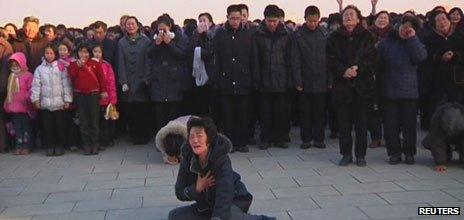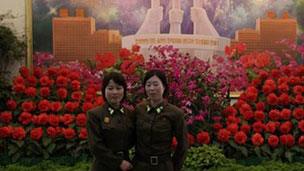North Korea: Life in cultural isolation
- Published

It's one of the most closed and secretive nations on Earth. But in the last 18 months, two BBC journalists have witnessed some of the more bizarre aspects of life in North Korea, a country now in mourning after the death of its leader, Kim Jong-il.
The announcer on state television who brought the news to the nation wore black and struggled to keep back the tears.
She said the 69-year-old had died of a heart attack after physical and mental overwork, news which sparked hysterical weeping in the streets of Pyongyang.
North Koreans have been taught from an early age to express devotion to both Kim Il-sung, the so-called Great Leader who died in 1994, and the Dear Leader, Kim Jong-il.
Two BBC journalists who visited the country in 2010, Sue Lloyd Roberts and Michael Bristow, had a first-hand glimpse of life inside North Korea. Here are some of their observations.
Students have no idea who Nelson Mandela is
At the university's foreign language department I asked the students how they had managed to learn such good English.
"Thanks to the Great Leader," one young man replied, "we are allowed to watch English and American films, like The Sound of Music."
When asked which world leaders - other than the Dear Leader - he admired, he quickly answered "Stalin and Mao Zedong!"
However, the students had not heard of Nelson Mandela.
Sue Lloyd Roberts, June 2010
Kim Il-sung died but is still the president
Little girls smiling widely and dancing in perfect formation, little boys in smart red suits and painted faces singing praises to the country's Great Leader.
It started off faintly charming. But with mask-like faces and rigid grins, even children become rather sinister.
More children are employed to sweep the steps leading up to the 60ft bronze statue of the Great Leader, which dominates Pyongyang.
Kim Il-sung died 16 years ago but he's still the country's president, and there are more than 500 statues of him.
"He's immortal," a 24-year-old-guide explained. "We don't believe he passed away."
Sue Lloyd Roberts, May 2010
Those who leave the country find it hard to adjust
No wonder the 3,000 or so North Koreans who escape this, the most isolated and secretive country in the world, and arrive in South Korea every year feel as though they have landed on another planet.
South Koreans can use their mobile phones to pay in the supermarket, there are more and faster broadband connections per person than in any other country in the world and, if you are feeling frivolous, there are cameras and touchscreen keyboards along the main shopping streets to allow you to send a photo to a friend.
All new arrivals from North Korea spend months in special government schools to learn how to cope with the 21st Century.
Sue Lloyd Roberts, June 2010
No-one has access to the internet
North Korean TV only broadcasts hagiographies of the two leaders and pictures celebrating the country's army, model farms, model villages etc.
Our minders had probably never seen any other kinds of news item or documentary about their country or the rest of the world.
They were not allowed to, and they could not, because no-one has access to the internet in North Korea.
Instead, the North Koreans have a special internal intranet which I was shown at Pyongyang University.
A postgraduate metallurgy student who spoke good English explained that he could not compare his research with a fellow student in say, London or Los Angeles, because the system would not let him.
But, he added brightly, "the Dear leader has kindly put all we need to know on our intranet system".
Sue Lloyd Roberts, June 2010
Pavements are scrubbed clean by hand
North Korea is about as isolated from the rest of the world as it is possible to be. There are few visitors and most of those are restricted to looking around a few chosen spots in Pyongyang.
Isolation has allowed the North Koreans to develop a way of living seldom seen elsewhere.
People cut the roadside grass with scissors, a time-consuming act, and wash the city pavements with scrubbing brushes and cloths, items usually reserved for the home.
The city is drab and colourless and there are few new buildings going up.
Michael Bristow, October 2010
The country's leaders have special flowers
Politics is everywhere in North Korea - even in the flowers. The country's leader Kim Jong-il and his father, the North's founder Kim Il-sung, both have flowers named after them.

The two blooms are called "Kimjongilia" and "Kimilsungia"
There is currently an exhibition in central Pyongyang showcasing the two blooms, called the "Kimjongilia" and the "Kimilsungia".
It was a holiday in North Korea on Monday, and hundreds of people - soldiers, couples and families with children - wandered around the exhibition centre.
Many had their photographs taken in front of the flowers. It is a measure of the devotion some people show towards the only two men to have ruled this secretive communist state.
I was given another glimpse of that respect from Pak Mi-gyong, an English-speaking guide at the floral exhibition.
I asked to take her picture in front of a giant portrait of the two Mr Kims that hung at one end of the main hall. She warned me that when taking a photograph I must be careful and include the men's whole bodies in the frame.
"They are our leaders and we respect them from the bottom of our hearts. We don't allow other people to cut the pictures of them," she said, a little angrily.
Michael Bristow, October 2010